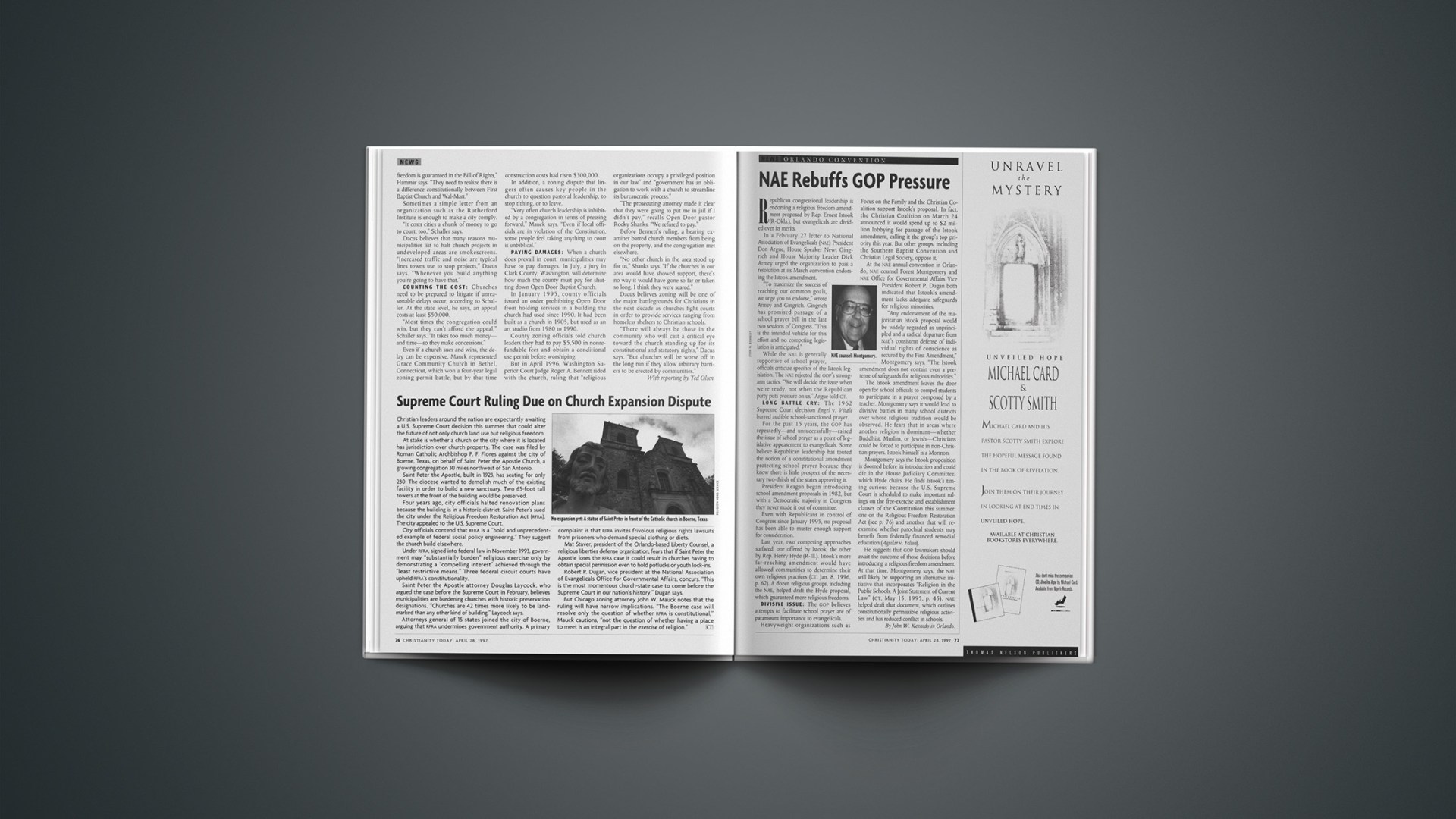Republican congressional leadership is endorsing a religious freedom amendment proposed by Rep. Ernest Istook (R-Okla.), but evangelicals are divided over its merits.
In a February 27 letter to National Association of Evangelicals (NAE) President Don Argue, House Speaker Newt Gingrich and House Majority Leader Dick Armey urged the organization to pass a resolution at its March convention endorsing the Istook amendment.
“To maximize the success of reaching our common goals, we urge you to endorse,” wrote Armey and Gingrich. Gingrich has promised passage of a school prayer bill in the last two sessions of Congress. “This is the intended vehicle for this effort and no competing legislation is anticipated.”
While the NAE is generally supportive of school prayer, officials criticize specifics of the Istook legislation. The NAE rejected the GOP’s strong-arm tactics. “We will decide the issue when we’re ready, not when the Republican party puts pressure on us,” Argue told CT.
LONG BATTLE CRY: The 1962 Supreme Court decision Engel v. Vitale barred audible school-sanctioned prayer.
For the past 15 years, the GOP has repeatedly—and unsuccessfully—raised the issue of school prayer as a point of legislative appeasement to evangelicals. Some believe Republican leadership has touted the notion of a constitutional amendment protecting school prayer because they know there is little prospect of the necessary two-thirds of the states approving it.
President Reagan began introducing school amendment proposals in 1982, but with a Democratic majority in Congress they never made it out of committee.
Even with Republicans in control of Congress since January 1995, no proposal has been able to muster enough support for consideration.
Last year, two competing approaches surfaced, one offered by Istook, the other by Rep. Henry Hyde (R-Ill.). Istook’s more far-reaching amendment would have allowed communities to determine their own religious practices (CT, Jan. 8, 1996, p. 62). A dozen religious groups, including the NAE, helped draft the Hyde proposal, which guaranteed more religious freedoms.
DIVISIVE ISSUE: The GOP believes attempts to facilitate school prayer are of paramount importance to evangelicals.
Heavyweight organizations such as Focus on the Family and the Christian Coalition support Istook’s proposal. In fact, the Christian Coalition on March 24 announced it would spend up to $2 million lobbying for passage of the Istook amendment, calling it the group’s top priority this year. But other groups, including the Southern Baptist Convention and Christian Legal Society, oppose it.
At the NAE annual convention in Orlando, NAE counsel Forest Montgomery and NAE Office for Governmental Affairs Vice President Robert P. Dugan both indicated that Istook’s amendment lacks adequate safeguards for religious minorities.
“Any endorsement of the majoritarian Istook proposal would be widely regarded as unprincipled and a radical departure from NAE’s consistent defense of individual rights of conscience as secured by the First Amendment,” Montgomery says. “The Istook amendment does not contain even a pretense of safeguards for religious minorities.”
The Istook amendment leaves the door open for school officials to compel students to participate in a prayer composed by a teacher. Montgomery says it would lead to divisive battles in many school districts over whose religious tradition would be observed. He fears that in areas where another religion is dominant—whether Buddhist, Muslim, or Jewish—Christians could be forced to participate in non-Christian prayers. Istook himself is a Mormon.
Montgomery says the Istook proposition is doomed before its introduction and could die in the House Judiciary Committee, which Hyde chairs. He finds Istook’s timing curious because the U.S. Supreme Court is scheduled to make important rulings on the free-exercise and establishment clauses of the Constitution this summer: one on the Religious Freedom Restoration Act (see p. 76) and another that will re-examine whether parochial students may benefit from federally financed remedial education (Aguilar v. Felton).
He suggests that GOP lawmakers should await the outcome of those decisions before introducing a religious freedom amendment. At that time, Montgomery says, the NAE will likely be supporting an alternative initiative that incorporates “Religion in the Public Schools: A Joint Statement of Current Law” (CT, May 15, 1995, p. 45). NAE helped draft that document, which outlines constitutionally permissible religious activities and has reduced conflict in schools.
Copyright © 1997 Christianity Today. Click for reprint information.










